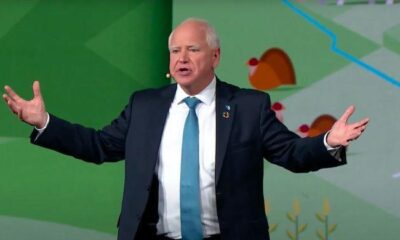Business
Gold And Silver May Crash Soon, Expert Predicts Major Fall In Prices Soon

Gold and silver prices have been on a record-breaking rise for months, touching all-time highs globally. While most brokers and market analysts predict the rally will continue, Amit Goyal, Co-founder and Chief Global Strategist of PACE 360—which manages over $2.4 billion in assets—has issued a stark warning: the surge may soon end with a major crash.

In Delhi, as of October 6, 24-carat gold costs Rs 1,19,540 per 10 grams, and silver is priced at Rs 1,54,900 per kilogram.

Goyal warns that both precious metals are at their “most dangerous peak in decades.”
He noted, “In the past 40 years, only twice have gold and silver performed this well when the dollar index was weak. In both cases, a massive crash followed.”

According to Goyal, gold and silver are nearing major psychological resistance levels—signals that often mark the end of a bull run.
“I expect both metals to hit these levels in the coming days or weeks, after which a sharp selling wave could begin,” he said.

Goyal predicts a 30–35% drop in gold prices, similar to the corrections seen after major rallies in 2007–08 and 2011, when gold crashed nearly 45%. Silver, he warns, could fall even harder—up to 50% from its peak. That means: Gold could drop to ₹77,701 per 10 grams. Silver could tumble to ₹77,450 per kilogram.

Goyal suggests investors wait for gold to fall to $2,600–$2,700 per ounce before re-entering the market. “At that level, gold will again become one of the best global investments,” he said. However, he advised caution with silver, citing weaker long-term prospects.

Goyal explained that silver’s industrial demand—used in photovoltaics, semiconductors, and electric vehicles—won’t be enough to offset the impact of a global slowdown.
He added, “Silver is currently overhyped and overbought, making it more vulnerable to steep declines.”

Experts caution that short-term traders may face volatility, while long-term investors should wait for corrections before making new entries. Diversifying portfolios beyond gold and silver is recommended to manage risk.

Disclaimer: The views expressed are those of market experts and do not reflect News18’s position. Investors are advised to consult certified financial advisors before making any investment decision
Business
AI shopping: Google partners Walmart, Shopify and Wayfair to turn Gemini into in-chat checkout platform; what you need to know – The Times of India

Google has expanded the shopping capabilities of its Gemini AI chatbot by partnering with major retailers including Walmart, Shopify and Wayfair, enabling users to browse and buy products directly within the chatbot, the company said on Sunday, AP reported.The move, announced on the opening day of the National Retail Federation’s annual convention in New York, positions Gemini as both a virtual shopping assistant and a transaction platform, allowing customers to complete purchases without leaving the chat interface.According to Google and Walmart, an instant checkout feature will let users buy products from participating retailers through multiple payment providers directly inside Gemini. Customers who link their Walmart and Gemini accounts will receive personalised recommendations based on past purchases, and items bought through the chatbot can be added to their existing Walmart or Sam’s Club online carts.“The transition from traditional web or app search to agent-led commerce represents the next great evolution in retail,” Walmart’s incoming president and CEO John Furner said in a joint statement with Google and Alphabet CEO Sundar Pichai.Google said Gemini’s shopping feature can respond to product-related queries — such as recommendations for ski gear — by pulling items from participating retailers’ inventories and facilitating purchases within the same conversation.The announcement comes amid intensifying competition among tech giants to dominate AI-powered commerce. Google, OpenAI and Amazon are all racing to enable seamless shopping experiences that take users from product discovery to checkout within chatbots.OpenAI and Walmart unveiled a similar partnership in October, allowing ChatGPT users to purchase most items available on Walmart’s website through instant checkout, excluding fresh food. Ahead of the holiday shopping season, OpenAI also launched in-chat purchasing for select retailers and Etsy sellers.Salesforce estimates that artificial intelligence influenced $272 billion, or about 20 per cent, of global retail sales during the recent holiday season.Google said the AI-assisted shopping features in Gemini will initially be available only to users in the US, with international expansion planned in the coming months.
Business
Boeing’s airplane deliveries are the highest in 7 years. Now it’s about to pick up the pace

A Boeing Co. 737 Max airplane at the company’s manufacturing facility in Renton, Washington, US, on Thursday, Nov. 20, 2025.
David Ryder | Bloomberg | Getty Images
Boeing is set to report this week that it delivered the most airplanes since 2018 last year after it stabilized its production, the clearest sign of a turnaround yet after years of safety crises and snowballing quality defects.
Now, the aerospace giant is planning to ramp up production.
“It’s a long road back from a … shall we say, a rather dysfunctional culture, but they’re making big progress,” said Richard Aboulafia, managing director at AeroDynamic Advisory, an aerospace industry consulting firm.
Boeing was forced to scale back production in recent years following two fatal crashes of its popular 737 Max aircraft in 2018 and 2019 and a midair blowout of a door plug from one of its planes in the first week of 2024. The Covid pandemic snarled airplane assembly at both Boeing and its chief rival, Airbus, with supply chain delays and loss of experienced workers, even after the worst of the health crisis subsided.
A Boeing 737 approaches San Diego International for a landing, May 10, 2025.
Kevin Carter | Getty Images
Boeing’s leaders, including CEO Kelly Ortberg — a longtime aerospace executive who came out of retirement to take the top job months after the midair door plug accident — are gearing up to increase production this year of its cash cow 737 Max aircraft and the longer-range 787 Dreamliners.
That could help the manufacturer, the top U.S. exporter by value, return to profitability, as analysts expect this year, territory that was out of reach for seven years as its leaders focused on damage control and were stuck reassuring frustrated airline executives who were awaiting late planes.
Their tone has changed as Boeing has become more predictable and increased production, with the Federal Aviation Administration’s blessing. In a sign of the FAA’s increased confidence in Boeing, the agency in September said Boeing could issue its own air worthiness certificates before customers receive some of its 737s and 787s after years of restrictions.
Boeing’s commercial aircraft business is its largest unit, accounting for about 46% of sales in the first nine months of last year, with the rest coming from its defense and services business. Boeing last reported a full-year profit in 2018.
Investors are optimistic for further improvement. Boeing shares have gained 36% over the last 12 months, outpacing the S&P 500‘s nearly 20% advance.
“Boeing is definitely better and more stable,” said Bob Jordan, CEO of all-Boeing airline Southwest Airlines, in an interview Dec. 10.
The company is scheduled to outline its production plans for 2026 later this month when it reports quarterly results on Jan. 27.
Getting into gear
For Boeing, the recent turnaround has taken place largely on the assembly floor.
Under Ortberg, the manufacturer has slashed so-called traveled work, in which assembly tasks are done out of order, to avoid costly mistakes. The company has made other manufacturing changes, as well, including added training.
The National Transportation Safety Board in June said inadequate training and management oversight had been among the problems at the company, according to its investigation into what led to the door plug blowout in January 2024.
On Dec. 8, Boeing also completed its acquisition of fuselage maker Spirit AeroSystems, which Boeing had spun out of the company two decades ago. It now has more direct control of the crucial supplier.
Moving out jets
Boeing handed over 537 aircraft in the first 11 months of last year. It reports December deliveries on Tuesday, but Jefferies estimates the company delivered 61 commercial jets last month, 44 of them Boeing’s bestseller, the 737 Max.
Boeing delivered 348 aircraft in 2024 and 528 in 2023. Last year’s total would still be far off the 806 airplanes it handed over in 2018.
Last October, the FAA raised its production cap on Boeing’s 737 Max from 38 a month to 42. (The FAA required its sign-off after the door plug accident.) CFO Jay Malave said at a UBS conference on Dec. 2 that he expects the company to get to that rate in early 2026. Ortberg told investors in October that further rate increases are on the table, in increments of five planes.
Kelly Ortberg, chief executive officer of Boeing Co., during a media event at the Boeing Delivery Center in Seattle, Washington, US, on Wednesday, Jan. 7, 2026.
M. Scott Brauer | Bloomberg | Getty Images
Handovers to airlines in 2026 will likely be new production, compared with clearing out older inventory, Malave had said. Boeing is also likely to produce about eight Dreamliners a month as of early this year, he added.
Deliveries are key for airplane makers, because airlines and other customers pay the bulk of an airplane’s price when they receive the aircraft. Boeing’s chief competitor, Airbus, is scheduled to report 2025 orders and deliveries on Monday.
Still, several planes that were expected to already flying passengers aren’t certified yet, including the Boeing 777X as well as the Max 7 and Max 10 variants, depriving Boeing of cash and driving up costs.
Southwest is awaiting the delayed Max 7, the smallest plane of the Max family. The model is important for airline routes that have lower demand so airlines can avoid oversupplying the market with seats, pushing down fares.
Southwest CEO Jordan last month said that he doesn’t expect the airline to fly the Max 7 before the first half of 2027 as Boeing certification work continues. Boeing at one point expected it to enter service in 2019.
“They’re still very short in terms of delivering the aircraft that we need, but I’m glad to see the progress on the Max 7,” Jordan told CNBC.
Robust demand
Orders for both Boeing and Airbus jets look solid, with demand set to continue outstripping supply into the next decade, Bernstein aerospace analyst Douglas Harned said in a note last week.
Airbus outpaced Boeing in deliveries last year, though Boeing appears to have outsold its European competitor in new orders.
Through November, Boeing logged 1,000 gross orders compared with 797 from Airbus. Airline customers have started to look beyond this decade, snagging delivery slots into the mid-2030s as they plot out growth and international expansions.
On Wednesday, Alaska Airlines said it is ordering 105 Boeing 737 Max 10 jets, the longest aircraft of the Max group. Alaska fleet chief Shane Jones told CNBC the order is a sign of “our confidence in the Max 10 certification” as well as “our confidence in Boeing and their turnaround and their ability to produce quality aircraft on time.”
Alaska also exercised options for five 787 Dreamliners for more international routes just over a year after it acquired Hawaiian Airlines — a combination that handed Alaska more Dreamliners and Airbus A330s to reach for destinations that it couldn’t get to before, like Japan, South Korea and Italy.
The wide-body aircraft market is now picking up steam, said Ron Epstein, aerospace analyst at Bank of America, with orders starting to get handed over faster to customers.
International travel, especially at the high end, has been particularly strong in the years after the pandemic as travelers splash out on vacations around the world. More and more global airlines are looking at snagging long-haul jets like Boeing’s Dreamliner and Airbus’ A330 and A350s for the coming years, heating up the wide-body airplane market, analysts said.
Globally, airplanes flew nearly 84% full in November, the highest level on record, according to the latest data available from the International Air Transport Association, an airline industry group.
With travel demand still robust, orders to replace older jets and secure new ones will continue to fuel growth.
“The magic, if you will, of air transportation is until somebody comes up with a transporter, you know, [like] ‘Star Trek,’ where you sort of vaporize and show up someplace else, we’re going to be flying,” Epstein said.
Business
‘Side Hustle Generation’: Over 50% Of US Gen Z Opting For Extra Gigs Amid Economic Uncertainty

Last Updated:
At least 57% of Gen Z in the US now have side gigs, from retail to gig work, amid economic uncertainty and concerns over the impact of AI on jobs.

Gen-Z is the first generation for whom a 9-to-5 job isn’t essential for achieving financial success. (AI-Generated Image)
Amid widespread economic uncertainty, more than half of the Gen Z population in the United States is opting for side gigs to navigate the job market and for extra cash.
At least 57% of Gen Z in the US now have side gigs, compared to 21% of boomers and older, according to The Harris Poll, which dubbed them “America’s first true ‘side hustle’ generation.”
Most of them are picking up side hustles, from retail to gig work, for extra cash. Younger people “want to work [and] find success, but many of them just feel disillusioned with the opportunities to get there through the traditional career ladder,” Glassdoor chief economist Daniel Zhao told Axios.
Role Of AI
In an August report, Glassdoor researchers said that some of the youths are chasing creative or entrepreneurial goals. Moreover, AI and other technological advances have made it easier for professionals to monetise their skills and passions.
“We’re witnessing a true side hustle generation where work identity lives outside of traditional employment. Additional commentary and research also shows that there’s a growing number of Employee+ workers who diversify income streams without abandoning job security,” Glassdoor said.
“For Gen Z, the day job funds the passion project. Work pays the bills, but identity and fulfilment can come from entrepreneurial pursuits, creative endeavours, or social causes they care about,” it added.
Why Are Gen-Z Opting For Side Gigs?
One of the main reasons for this shift is job anxiety. Recent graduates are struggling to secure jobs, while those with them aren’t seeing the career growth they expect, according to Zhao.
Data shows that the financial optimism for college students has fallen to their lowest level since 2018, mostly due to concerns over unemployment and ‘AI-induced layoffs’. The advent of AI remains the most pressing concern among young workers.
As per The Harris Poll, Gen Z is the first generation for whom a 9-to-5 job isn’t essential for achieving financial success. Side hustles are not merely distractions or fallback options; they are central to Gen Z’s identity, offering creative, entrepreneurial, or activist outlets that main jobs cannot supply.
“It definitely makes me feel more financially secure,” Katie Arce, who works full-time in e-commerce and picks up shifts at a vintage clothing store in Austin, Texas, told Axios.
United States of America (USA)
January 11, 2026, 17:08 IST
Read More
-

 Sports6 days ago
Sports6 days agoVAR review: Why was Wirtz onside in Premier League, offside in Europe?
-

 Entertainment4 days ago
Entertainment4 days agoDoes new US food pyramid put too much steak on your plate?
-

 Politics4 days ago
Politics4 days agoUK says provided assistance in US-led tanker seizure
-

 Entertainment4 days ago
Entertainment4 days agoWhy did Nick Reiner’s lawyer Alan Jackson withdraw from case?
-

 Business7 days ago
Business7 days ago8th Pay Commission: From Policy Review, Cabinet Approval To Implementation –Key Stages Explained
-

 Sports7 days ago
Sports7 days agoSteelers escape Ravens’ late push, win AFC North title
-

 Politics6 days ago
Politics6 days agoChina’s birth-rate push sputters as couples stay child-free
-

 Entertainment6 days ago
Entertainment6 days agoMinnesota Governor Tim Walz to drop out of 2026 race, official confirmation expected soon










